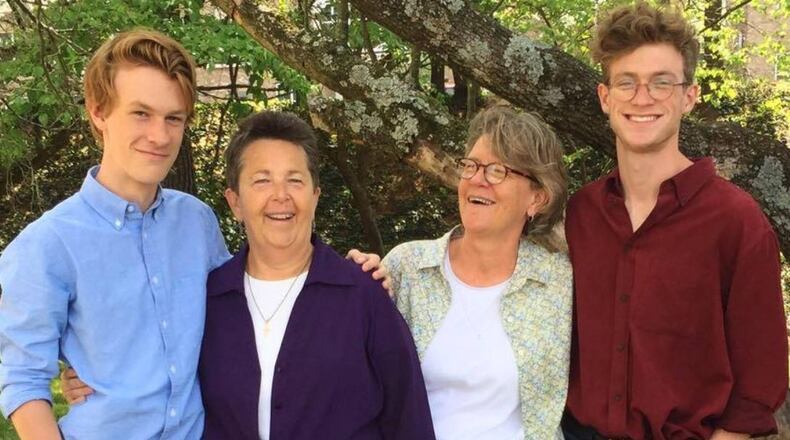Linda Ellis is the executive director of the Health Initiative, an organization supporting the health of LGBT Georgians. She and her partner Lesley live in Decatur and are parents to two sons, John, 19, and Sam, 15.
In this piece, Ellis talks about how her own marriage, family and life have become fairly typical as more Americans accept gay unions. She and her wife are regular community and school volunteers. Their boys are active teens with a range of friends and interests. They have peace and normalcy in their daily lives, says Ellis.
Ellis says she wants that same peace for transgender children and their parents in Decatur and throughout the country. City Schools of Decatur has a longstanding policy protecting trans students and respecting their chosen gender identify. However, the policy came under fire at a recent school board meeting from two parents and an attorney, and now a petition is attempting to undo the protections.
Credit: Maureen Downey
Credit: Maureen Downey
The petition maintains, "Many transgender activist groups insist that transgender students be treated in every respect as the gender they identify with, and not by their biological sex. We insist that there are areas in the education system where anatomical sex must be the sole distinctive trait considered. In these areas, gender identity is not interchangeable with sex." The petition says those areas are athletics, locker rooms and bathrooms.
While Decatur Superintendent David Dude did not respond to the critics at the board meeting, he signaled his support for trans students and Decatur's policy by adding the rainbow flag -- adopted by LGBT communities as a symbol -- to his Facebook profile.
An organized effort is underway to show support for Decatur's policy by asking citizens sign a pledge that states, "These protections—that transgender students be addressed by their proper pronouns and be allowed to participate equally in school activities—have been in place for more than 10 years, making our school district a nationwide leader when it comes to ensuring that transgender students don't have to face discrimination at school."
The school board plans to discuss the policy at its Oct. 10 meeting. With that background, here is the column by Ellis.
By Linda Ellis
Years ago, a theology professor of mine suggested that one meaning of the Hebrew word, Shalom, was normalcy. At first hearing, that definition didn’t seem go with my understanding of its better known meaning, “peace.” But over time, I have learned to appreciate and value the radical peace that exists in normalcy. Normalcy is wholeness, it is fitting in your space, it is finding everything as it is supposed to be.
As a lesbian couple raising a family, my partner Lesley and I have been lucky enough to create a good, normal life. We have lived in the city of Decatur since 2003. Our sons have made their way through Decatur’s schools from pre-K to high school. They are both good students who (in our parental opinions) could be even better ones if they tried a little harder. Along the way, they’ve both developed friendships and found their way into clubs and activities that fit their individual interests. As a family, we are active members of a church here in town. We're as involved in our community as our busy schedules allow.
We’ve volunteered, coached sports teams (Lesley) and served on city committees and boards (me). Our day-to-day life looks much like that of our neighbors, largely because it is. We all go to work, make sure that the bills get paid, the grass gets cut and dinner gets put on the table. This is our normal. And for us, this is shalom.
But the peace that comes with normalcy wasn’t guaranteed when Lesley and I had our commitment service in 1991. It was a difficult and frightening time for us. People we loved and cared for, as well as many we only casually knew (and some we didn’t know at all) could not understand or accept our relationship. They knew few lesbian or gay people, they thought we were wrong, and we scared them.
We didn’t get to normal easily. It required a willingness to sit down and take some risks on both sides. Our straight family and friends had to be open to educating themselves about our experience. We had to be patient with their questions. And we all had to be willing to sit with the discomfort of a relationship in progress. Together, we worked to clarify misconceptions and stick with each other when mistakes were made and feelings were hurt.
Through the years, we’ve gotten closer and closer to the normalcy we’ve sought. Our world isn’t perfect - there’s still the occasional awkward question about roles or the raised eyebrow when someone learns that my partner is my wife, rather than husband -- but for the most part, we’re just another set of parents volunteering in the football game concession stand, along with all the other band boosters.
Today, the steep learning curve that most of us face is not understanding sexual orientation, but gender identity. Transgender individuals are pushing those of us who are cisgender to understand and accept their experience as right and good alongside our own. There are new words to be learned, and old concepts to be turned upside down. There are some risks to take on both sides and there are many questions. I know - because I’ve asked a lot of them.
Honestly, questions of gender identity were new ones for me -- it just wasn’t my world. But as I stretch myself to understand and appreciate the experiences of transgender adults, adolescents and children who don’t fit our preconceived categories of gender, and their parents, I recognize in them a familiar desire for normalcy.
Some families of trans kids are almost afraid to hope that normalcy will be possible for their children. Their fear is not because there is something innately wrong with their kids, but because of us -- because they see us react so often out of fear and ignorance in a way that does real harm to their children. The research regarding trans children and youth is not easy to read. Article after article measures challenges to mental health, increased anxiety and suicide risks, and the impacts of bullying and harassment. The worry is real. If you need to convincing, just google "Ally Steinfeld, 17, Missouri."
Yet, there is hope in the evidence that even the smallest interventions and offers of support significantly improve the outcomes for trans youth. The research shows that trans youth experiencing strong social support are significantly less likely to act upon suicidal thoughts, and that something as simple as being able to safely use the bathroom at school decreases bullying and makes for a greater feeling of overall safety for trans students.
But as I write this, some here in Decatur are challenging our school system’s long-standing nondiscrimination policy, and the school superintendent’s guidance on how to comply with that policy, that allows transgender students and their parents to choose the accommodations that suit them best. They have hired an attorney to help them make their case and have publicly stated their fears include transgender girls having an unfair advantage in sporting events or that trans girls using the girls bathroom might be offensive to some whose cultural and religious beliefs require modesty. My guess is that these families have other concerns that they’ve not voiced, and my concern is that hiring an attorney may not be the best way to open a conversation.
I know it will take more than credible research and board sanctioned policies to build a bridge to normalcy. As I learned with my own family and friends, transforming “other” to “normal” takes courage, patience and a willingness to listen with an open heart.
It might start by sitting down and having a conversation with the parent of a trans kids. That’s what I did. They are my neighbors (and yours). They tell me that, for their kids, being called by the right name or being able to use the bathroom that fits their identity has been life-changing. They’ve seen grades improve, behavior problems and social anxiety decrease, and friendships develop. The focus shifts from rushing home after “holding it” all day at school, to staying after to try out for the volleyball team.
As parents, we all want the same things for our kids. Even if we have different understandings of politics or faith, I believe we all can agree that we want our kids to have the best possible opportunities. We want them to feel supported and accepted as they are, to strive to fulfill their potential, to find happiness, to be kind, and to contribute to the world around them. We want them to have a chance at a good, normal life.
We want shalom.
About the Author
Keep Reading
The Latest
Featured





